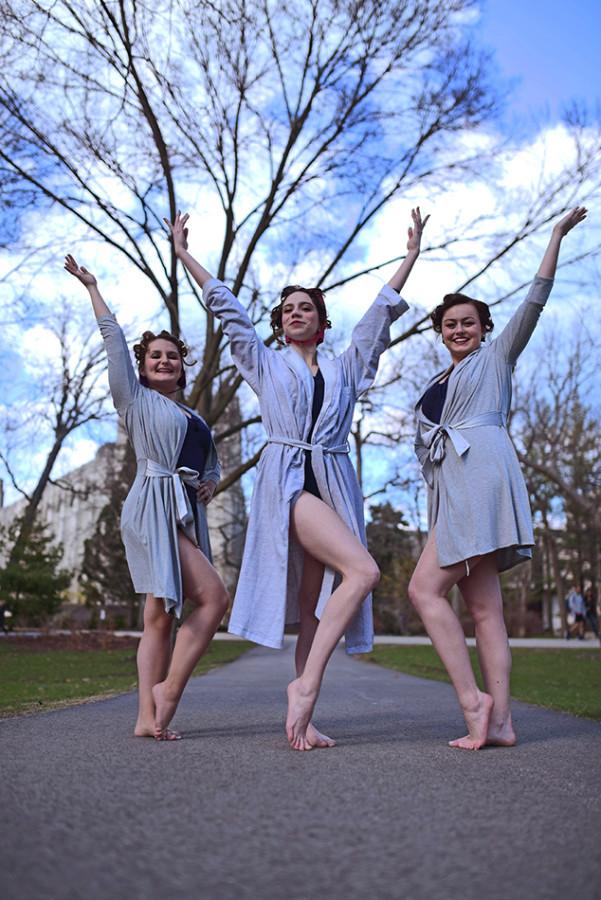Team behind Waa-Mu Show shares experiences
Cast members from “Gold” pose in costume. More than 100 Northwestern students worked to put on this year’s Waa-Mu Show.
April 30, 2015
A&E
Monday night’s Waa-Mu Show rehearsal was when things finally started to click for Bienen junior Jon Bauerfeld and Communication senior Kylie Mullins. As one of the actors sang “Flying,” a song the two wrote together, with full orchestral accompaniment for the first time, Bauerfeld and Mullins shared exuberant looks across room.
“That moment is a journey that took months,” Bauerfeld said.
It’s Tuesday evening, with just three days of rehearsals remaining before this year’s Waa-Mu Show, “Gold,” officially opens Friday. Members of the show’s creative team, including co-chairs Mullins and Weinberg senior Hannah Dunn, and head writers Bauerfeld and Communication junior Myrna Conn are sitting in a half-circle in the lobby of Cahn Auditorium, their self-proclaimed home for the last few weeks, surrounded by water bottles, USA sweatshirts and a half-finished Blaze pizza. The group is later joined by co-chair Max Rein, a Weinberg senior, and head writer Charlie Oh, a Communication junior.
“We’re delirious,” Mullins said with a laugh, as the team recounted the hard work, behind-the-scenes script changes and Costco snack runs that led to that day.
For most of the members, the journey to this year’s show began years ago. Conn came to Northwestern for the opportunity to become a part of the annual theater production, after visiting a rehearsal for the show as a prospective student, where she also met Mullins for the first time.
As one of the head writers, Conn played a key role in shaping the 84th annual Waa-Mu, which tells the story of athletes competing in the 1936 Olympic Games, held in pre-World War II Berlin. As always, the show is written by NU students, but this year it’s an original show — not an adapted book like what’s been done in the last few years.
The co-chairs for this year’s production were chosen almost a year ago and work for the show began immediately. The team read books and pitched ideas throughout the summer, but the idea for “Gold” finally came about at the end of August, when they were talking with Communication Prof. David Bell, the director, who choreographed a portion of the closing ceremony for the 1992 Summer Olympic Games in Barcelona.
“We started talking about how much we loved the Olympics,” Mullins said. “And then we were all just like, ‘Let’s do it.’ It all just happened really fast.”
The subject matter itself brought another set of challenges for the creative team, who had to figure out the best way to demonstrate the complex pre-war German setting.
“There are some stakes,” Mullins said. “Writing about these stakes from the perspective of athletes… who didn’t know World War II was coming. … Writing in 2015 from the perspective of 1936 is hard.”
Throughout Fall Quarter, the team worked together to lay the foundation for Winter Quarter, when 70 people participated in a class where the show is divided into sections and written by different students. By the end of Winter Quarter, the first draft of the show, as well as a number of songs, were completed and the team spent Spring Break putting the entire script together. The first workshop took place during the first week of Spring Quarter, but the editing and writing process is never complete.
“Everyone is learning constantly,” Mullins said. “The whole cast becomes really close, because I personally think that they all recognize the work and the time that everyone’s putting into the show and how passionate everyone is about it.”
Mullins said one of the benefits of the constantly evolving script is that actors have a chance to directly shape how the show and script develops.
“Every day there’s a new thing that gets added that makes it more exciting,” Dunn said. “We get to see the show come to life in new ways every day.”
Conn and Bauerfeld also run Team Music, which has members that deal with vocal arrangements, orchestration and making sure information is constantly updated. The elaborate Dropbox system the team uses includes drafts of all past and present music files, a system used in professional theater companies as well, Bauerfeld said.
“It’s the best way to learn,” he said.
While the entire team agrees that the constant revisions are the most challenging part of the process, the unique ability to create a musical from scratch stands out for everyone.
The pizza is gone, water bottles are half-empty and most of the team is rushing off to get ready for its 7 p.m. rehearsal.
“On the days when we haven’t slept in weeks … you think about painting The Rock with this cast and dancing to ‘Get’cha Head in the Game’ from ‘High School Musical’ and filming promo videos with the women’s basketball team in Welsh-Ryan,” Mullins said. “All of this cool stuff that you wouldn’t get to do, if you didn’t do this show. We hold onto that a lot.”
Email: [email protected]
Twitter: @anniefb13


